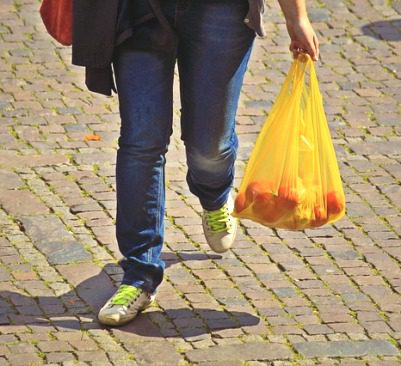Many people don’t realize how big the plastic bag pollution problem is. Surprising, since much of what we buy today is made of plastic or packaged in plastic, and then carried home in a plastic bag. All this petroleum use is a boon for the oil industry, and the plastic bag itself is a fantastic business success story. But they are unnecessary and so unhealthy for the rest of the planet.
We are literally awash in plastic waste, throwing so much of it away every day that it’s everywhere. Unlike drink bottles and marine trash, it doesn’t take a body of water to move shopping bags from place to place. All you need is a little wind, and that bag becomes a kite. So, it’s very difficult to keep the now 5 trillion bags put into circulation every year.
 In the past couple decades, plastic bag pollution has turned into a global problem. One that increases in size and severity by the hour. National Geographic News interviewed British marine biologist David Barnes in 2003. He related how finding bags everywhere went from a rarity in the early 1990s to a commonplace by 2003. At the time, they were washing ashore from northern Norway to the Falkland Islands in the South Atlantic. And Barnes predicted it to arrive in Antarctica before the arrival of the 2010s.
In the past couple decades, plastic bag pollution has turned into a global problem. One that increases in size and severity by the hour. National Geographic News interviewed British marine biologist David Barnes in 2003. He related how finding bags everywhere went from a rarity in the early 1990s to a commonplace by 2003. At the time, they were washing ashore from northern Norway to the Falkland Islands in the South Atlantic. And Barnes predicted it to arrive in Antarctica before the arrival of the 2010s.
By 2012, Smithsonian Magazine reported that plastic bag pollution was included in the high levels of plastic debris afloat in the waters off of Antarctica. They’re also wafting around the wilderness and farmland, caught on fences, in the weeds, and trees. Perhaps in lower concentrations than in the suburban or city landscape, but they’re just the same.
Reusable fabric shopping bags could instantly lessen plastic bag pollution. Many people dislike them, viewing them as an inconvenience. Recycling plastic bags will do little to decrease their existence as a pollutant. Nor will it stop the harm done to wildlife and domesticated animals from becoming entangled in, suffocated by, or swallowing the billions of bags at large on Earth.
Bioplastics make more sense than recycled paper when it comes to battling plastic bag pollution. About a decade ago, a company in Colorado created corn-based PLA shopping bags. Unfortunately, the bioplastic made from corn does not degrade quickly. They are as big a problem as petroleum-based plastic bags.
Recently, Avani, a company in Indonesia, came up with biodegradable shopping bags. They are strong, and look and feel like plastic, but are not plastic at all. Made from plant-based materials, Avani bags are strong, but readily break down in a landfill or the environment. Check out Avani’s spokesman Kevin Kumala make one of their bags to break down on demand and drinking it in water!
You would never want to drink plastic bag infested water. Not just because you don’t know where that pile of bags has been, or what was in them. The chemicals in plastic are harmful to your liver and cause cancer. They don’t use food-safe plastic to make shopping bags.
Replacing plastic would make the world a better, safer place. Stopping and reversing plastic bag pollution is a change sorely needed by humans, livestock, wildlife, and our environment.
Learn more:
Images courtesy of Mitchell Haindfield,